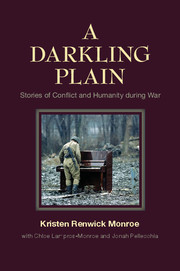Book contents
- Frontmatter
- Epigraph
- Contents
- Preface
- Introduction
- Part one War is a Terrible Thing!
- Part Two Guarding One’s Humanity During War: World War II
- Part Three Other Voices, Other Wars: From Indochina to Iraq
- Part Four Civil Wars and Genocides, Dictators and Domestic Oppressors
- Part Five My Story, Your Choice How to Use it
- 20 The Fundamental Things Apply
- Conclusion
- Bibliography
- Acknowledgments by the Senior Author
- Index
20 - The Fundamental Things Apply
Published online by Cambridge University Press: 05 October 2014
- Frontmatter
- Epigraph
- Contents
- Preface
- Introduction
- Part one War is a Terrible Thing!
- Part Two Guarding One’s Humanity During War: World War II
- Part Three Other Voices, Other Wars: From Indochina to Iraq
- Part Four Civil Wars and Genocides, Dictators and Domestic Oppressors
- Part Five My Story, Your Choice How to Use it
- 20 The Fundamental Things Apply
- Conclusion
- Bibliography
- Acknowledgments by the Senior Author
- Index
Summary
What lessons can we draw from the stories in this book? Are there shared patterns in wartime struggles for survival? Common themes in efforts to compose meaningful postwar lives? Can these stories help us think about the influences shaping our own abilities to retain humanity during times so searing they challenge our most basic values and underlying assumptions about what it means to flourish as human beings? The topic does not lend itself to facile answers, but insights are nonetheless discernible.
Simply put, we find the fundamental things apply. Those things that center us and provide meaning to our lives during peacetime – so unremarkable, yet precious once lost – prove critical in keeping our sanity, let alone our humanity, during war: love, friends, family, a sense of who we are, of belonging, of having value as a person. Beyond this, analysis underlines the importance of the human psychology, provides vital details concerning psychological mechanisms that contribute to emotional well-being, and suggests these can operate in ways that seem counterintuitive on first glance. (Table 20.1 summarizes our findings and links them with prior work in the field.)
- Type
- Chapter
- Information
- A Darkling PlainStories of Conflict and Humanity during War, pp. 261 - 290Publisher: Cambridge University PressPrint publication year: 2014

